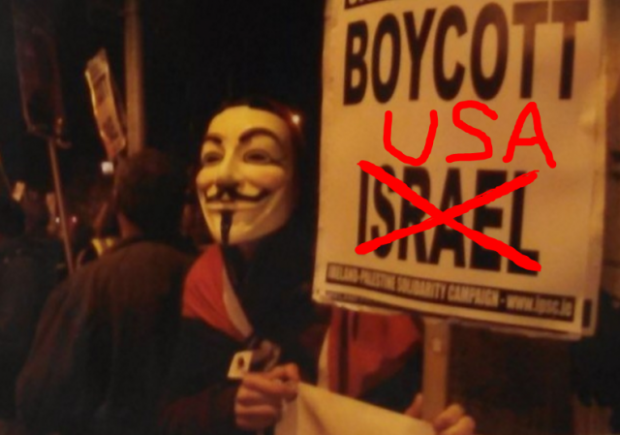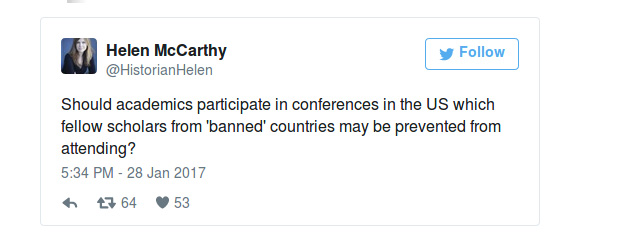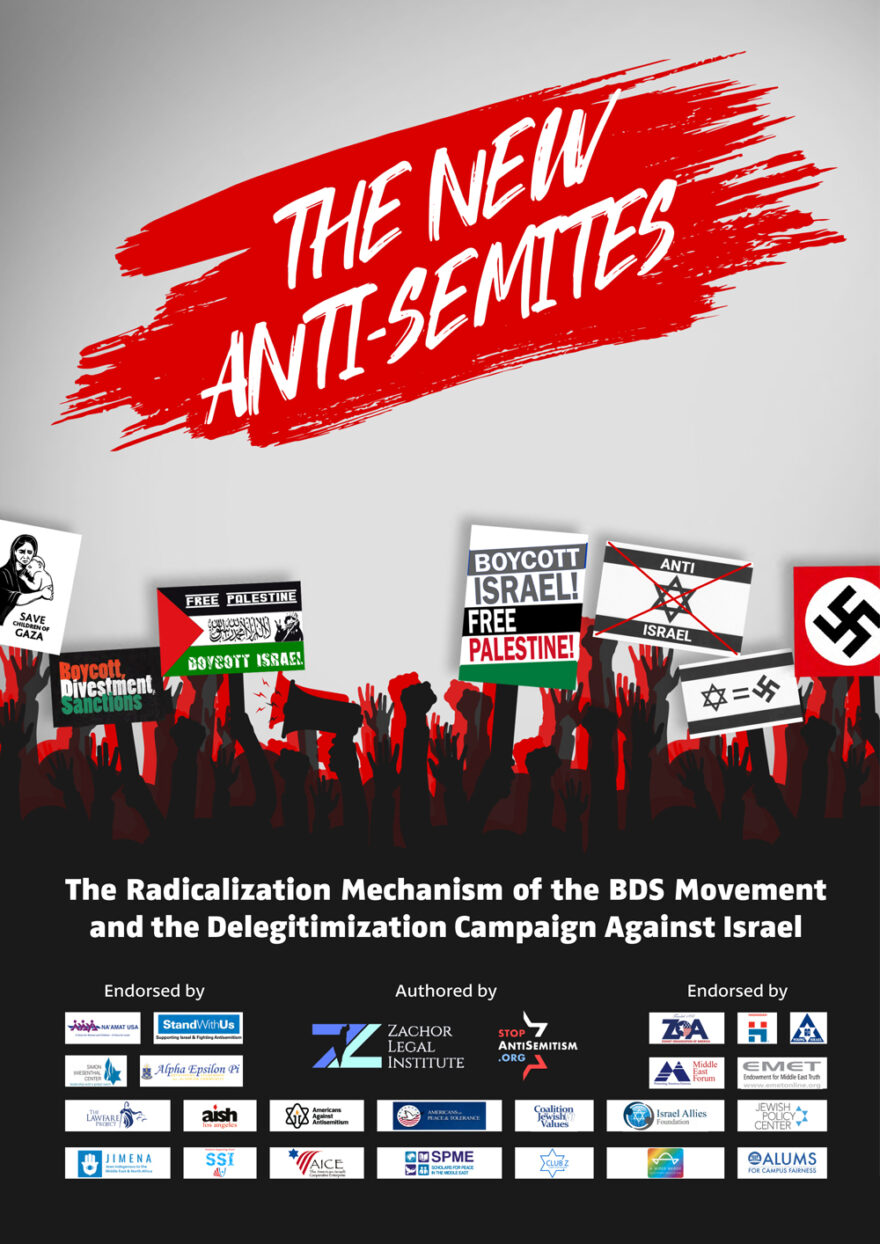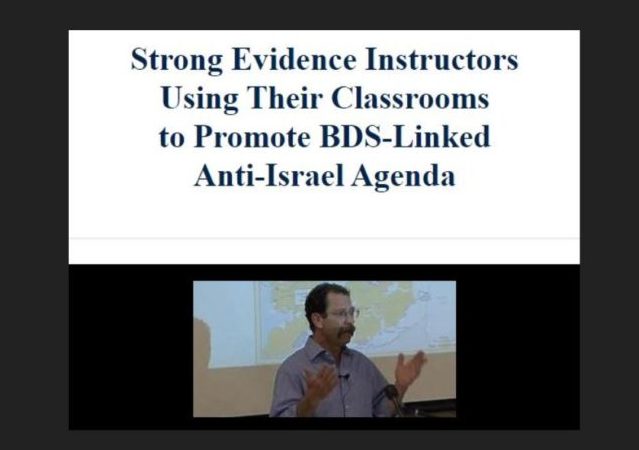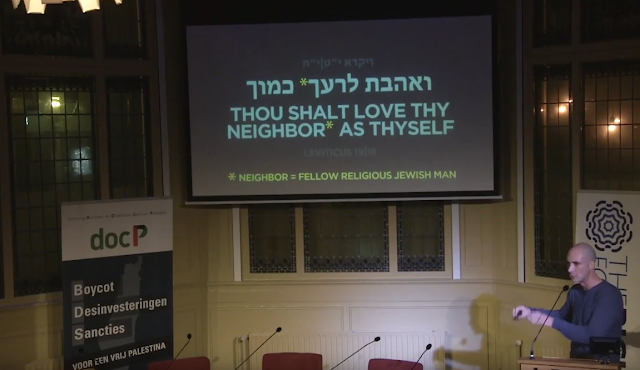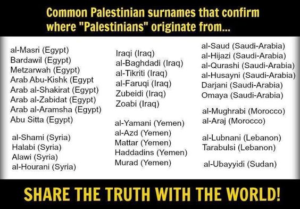|
|
The insane left has been calling for academic boycotts of Israeli Academics for decades.Now they are getting a taste of their own medicine.Would you like salt with your Crow? |
|

Academic boycott launched AGAINST U.S. after Trump Immigration Executive OrderPosted by William A. Jacobson January 31, 2017 http://legalinsurrection.com/2017/01/academic-boycott-launched-against-u-s-after-trump-immigration-executive-order/ It’s not like I told you so. But I told you so. Many, many times. To those in the U.S. academic community who support the academic boycott of Israeli academics because they don’t like the policies of the Israeli government, I warned that they better prepare for the day when foreign academics start to boycott them for the actions of the U.S. government. That day has arrived sooner than I thought. Though the boycott of U.S. academics being mounted is much less severe than the boycott sought against Israel, it’s a boycott nonetheless. The Chronicle of Higher Education reports:
A column in The Guardian raises the same issue, Should academics boycott Donald Trump’s America?:
I’m basically laughing my ass off over this development because it proves my point that academic boycotts are a systemic threat. I still haven’t seen anyone call for an academic boycott of Turkey, despite thousands of academics having been arrested. And what about all the Arab countries and universities controlled by Hamas and the Palestinian Authority where there is no academic freedom? Pretty selective outrage among the circular firing squad forming on the left. UPDATE: The boycott is spreading, particularly in Canada, as the Toronto Star reports, and accusations that the U.S. is an Apartheid State are being made (just as they are made against Israeli to justify the boycott), Canadian academics boycott U.S. conferences over Trump ban: |
|
|
|
New Report Confirms Ties Between BDS-Promoting NGOs and Terrorist OrganizationsDavid Lange February 3, 2019 https://www.israellycool.com/2019/02/03/new-report-confirms-ties-between-bds-promoting-ngos-and-terrorist-organizations/ Israel’s Ministry of Strategic Affairs and Public Diplomacy (MSA) today released its “Terrorists in Suits” report, which reveals over a whopping 100 links shared between the internationally-designated terrorist organizations Hamas and the Popular Front for the Liberation of Palestine (PFLP) and at least 13 anti-Israel BDS promoting NGOs.
 Ministry Of Strategic Affairs Report On “Terrorists In Suits” https://4il.org.il Click to Download the Report.
What Starts Online, Doesn’t Stay There |
|
BDS Leader Shredded by Missouri State Representatives |
|
New Damning Report Exposes the Dangerous Connection Between BDS Movement and Jew HatredBy David Lange 17December2019 https://www.israellycool.com/2019/12/17/new-damning-report-exposes-the-dangerous-connection-between-bds-movement-and-jew-hatred/
|
|
Trump signs executive order to combat anti-Semitism on college campusesJennifer Kabbany – Fix Editor 11December2019 https://www.thecollegefix.com/trump-signs-executive-order-to-combat-anti-semitism-on-college-campuses/ ‘My administration will never tolerate the suppression, persecution or silencing of the Jewish people’ President Donald Trump on Wednesday signed an executive order that aims to fight anti-Semitism — particularly on college campuses — by clarifying that federal laws protect against discrimination against Jewish people and warning public institutions could lose funding if they ignore “the vile, hate-filled poison of anti-Semitism.” “This action makes clear that Title VI of the Civil Rights Act, which prohibits the federal funding of universities and other institutions that engage in discrimination, applies to institutions that traffic in anti-Semitic hate,” Trump said in a ceremony right before signing the order. “This is our message to universities,” Trump said. “If you want to accept the tremendous amount of federal dollars that you get every year, you must reject anti-Semitism. It’s very simple.” |
|

New Research Study: Faculty Promote Their Anti-Israel Agenda In ClassesPosted by Samantha Mandeles Monday, 13January2020 https://legalinsurrection.com/2020/01/new-research-study-faculty-promote-their-anti-israel-agenda-in-classes/#more-306128 AMCHA Initiative: “Distorting and blocking the flow of knowledge is a violation of the norms and standards of scholarly inquiry and undermines the university’s academic mission”
In the years since our founding, Legal Insurrection has covered anti-Israel activism on our nation’s campuses. Though expressions of anti-Zionism on campus are often the work of radical student groups such as Students for Justice in Palestine (SJP), behind many such groups and their anti-Israel messaging stands faculty support for the Boycott, Divestment and Sanctions (BDS) campaign. For a recent example, see the latest attempt by a small minority of faculty to pass a BDS resolution at the American Historical Association’s annual meeting in American Historical Association Rejects Anti-Israel Resolution for the 4th Time. Of particular concern are university faculty who use their classrooms as platforms for spreading anti-Israel propaganda. Now, a new report released January 8th by the Santa Cruz-based AMCHA Initiative “provides the first-ever empirical evidence suggesting that faculty who support the academic BDS movement against Israel are actively promoting that political agenda directly to students in their classrooms.”
Founded by University of California academics Leila Beckwith and Tammi Rossman-Benjamin, the AMCHA Initiative monitors and combats anti-Jewish activity on hundreds of college campuses across the United States. The organization does excellent work; most recently, Legal Insurrection Foundation signed on to an AMCHA-authored letter expertly analysing and opposing a proposed anti-Israel public school curriculum in California (Legal Insurrection Foundation opposes proposed anti-Israel public school curriculum in California). AMCHA’s newest report builds on the group’s prior studies, which we have covered in the following posts:
The study, which examined 50 syllabi at 40 public and private American colleges and universities, was undertaken by AMCHA founders Professor Beckwith (Professor Emeritus at UCLA, renowned scientist, researcher, and statistician with a background in psychology and child development) and Professor Rossman-Benjamin (expert on antisemitism and former faculty member in Hebrew and Jewish Studies at the University of California). You can read the full study here (pdf) or below:
The study’s conclusions are disturbing; it found that:
But there are ways universities can combat professor-propaganda if they so choose; helpfully, AMCHA’s report includes concrete action items for university leaders to pursue in order to address these problems:
Ultimately, AMCHA’s report concludes that
|
|

Federal Court upholds constitutionality of Arkansas anti-BDS lawPosted by William A. Jacobson 23January2019 https://legalinsurrection.com/2019/01/federal-court-upholds-constitutionality-of-arkansas-anti-bds-law/ “Because engaging in a boycott of Israel, as defined by Act 710, is neither speech nor inherently expressive conduct, it is not protected by the First Amendment.” The U.S. has had a federal anti-Boycott law (Anti-boycott Regulations) on the books since the 1970s, to counter the Arab League Boycott of Israel. There is under consideration in Congress, and many states have passed, laws to modernize the anti-Boycott laws to take into account the new form of the boycott, the so-called Boycott, Divestment and Sanctions movement. As I have proven, BDS is a new form not only of the anti-Jewish boycotts of the 1920s and 1930s, but also of the Arab League Boycott, The REAL history of the BDS movement. The popular wisdom is that such laws are an unconstitutional infringement on free speech. This popular wisdom is based on a misunderstanding of the law and the laws. A decision in Arkansas upholding Arkansas’s anti-BDS law is a case in point. The Arkansas Times challenged Arkansas’ anti-BDS law, represented by the ACLU:
You can read the Brief in Opposition to the Preliminary Injunction and Brief in Support of Motion to Dismiss filed by Arkansas, setting for the arguments that the anti-BDS law was constitutional. Chief Judge Brian S. Miller in the Eastern District of Arkansas just threw out the lawsuit in an opinion which concluded that the law was not as the Judge initially expected it would be. The Order (pdf.) is embedded at the bottom of this post. The Judge’s opening paragraph was instructive of why we shouldn’t accept the common wisdom:
The Judge noted that there are many similar laws:
Here’s the heart of the Judge’s legal analysis upholding the law:
The court also rejected the common wisdom that there is an unfettered right to boycott:
The court then dismissed the case. In Arkansas, as elsewhere, anti-Israel pro-BDS activists still can dress up as peppers to protect America from Zionist vegetables. But they can’t contract with the state if they conduct their business with the state in a discriminatory fashion by boycotting Israel. Roz Rothstein of the pro-Israel StandWithUs is thrilled:
I’m sure the reaction from anti-Israel activists will be furious. I’m not familiar enough with the various state laws to compare Arkansas’s anti-BDS law to the others. But clearly the issue is not as clear cut, from a constitutional perspective, as some would have you believe. |
|

Full 8th Circuit Upholds Arkansas Law Barring State Contracting With Israel Boycotters (BDS)State power to regulate economic activity includes the power to regulate the purely commercial conduct of a boycott, appellate court says.Posted by Johanna Markind 22June2022 https://legalinsurrection.com/2022/06/full-8th-circuit-upholds-arkansas-law-barring-state-contracting-with-israel-boycotters-bds/ Arkansas’s anti-BDS law requiring state contractors to certify they don’t boycott Israel passes constitutional muster, according to the full Court of Appeals for the Eighth Circuit. The court’s decision in the highly watched case of Arkansas Times LP v. Waldrip, handed down this morning, affirmed the lower court decision upholding the state law. LIF covered the case previously, at:
Back in 2019, U.S. District Judge Brian S. Miller dismissed the case after finding that the state violated no constitutional right by requiring its vendors to certify that they don’t boycott Israel. The case was appealed. A 2021 decision by the Eighth Circuit initially reversed the lower court and claimed the law violated the First Amendment, based on a tortured reading of the statute. The Eighth Circuit then vacated (i.e., rescinded) that decision and ordered the case reheard before all judges of the circuit, instead of just the three-judge panel who had decided it earlier. The case was reargued on September 21, 2021. Judge Jonathan A. Kobes, who dissented from the vacated 2021 decision, wrote the majority opinion upholding the law. “The basic dispute in this case,” Kobes wrote, “is whether ‘boycotting Israel’ only covers unexpressive commercial conduct, or whether it also prohibits protected expressive conduct.” Briefly, the court upheld the state’s right to regulate boycotts as commercial conduct. While economic boycotts are often accompanied by expressive conduct protected by the First Amendment, Kobes’ majority opinion concluded, the boycott itself is not protected by the First Amendment. The opinion on this point corrected an absurd misreading of the statute’s so-called catch-all or garbage can provision in the vacated opinion. Frequently, laws will list examples of things that are covered by it, and then add in something like, ‘and other actions.’ That’s exactly what the Arkansas statute does. The court’s opinion explained:
The vacated opinion had tried to read “other actions” as covering protected speech activities, but its context in the statute indicates that “other actions” refers to commercial activities. Furthermore, accepted canons of statutory construction require a court to interpret a statute as presumptively constitutional, and not to stretch its meaning to force an unconstitutional reading. The Eighth Circuit’s en banc opinion read the law in this limited, presumptively constitutional way. It held that the law only applies to commercial activities, and is constitutional. Furthermore, the court’s opinion continued, the certification required of vendors is not unconstitutionally compelled speech. The majority opinion noted, “We are not aware of any cases where a court has held that a certification requirement concerning unprotected, nondiscriminatory conduct is unconstitutionally compelled speech.” Although the majority opinion did not discuss this, government contractors are commonly required to provide certifications for many things, including their assurance that they do not discriminate. In fact, the paperwork government contractors are required to submit is frequently copious and oppressive. But, certifications of this nature have not been held to be unconstitutionally compelled speech. Judge Jane L. Kelly, who wrote the subsequently-vacated opinion reversing Judge Miller’s original decision, wrote a dissent. She continued to argue that the term “other actions” in the statute reading
It’s unclear and therefore should be interpreted as potentially including expressive activity protected by the First Amendment. This is the first federal appellate opinion to address the substantive issues of anti-BDS laws, which have not been specifically addressed by the Supreme Court. (The Fifth and Ninth Circuit appellate courts previously vacated district court opinions after the states involved amended their anti-BDS laws, but neither court addressed the merits of the cases below.) Another case, A&R Engineering and Testing, Inc. v. Paxton, is currently pending before the Fifth Circuit. Circuit courts are not bound by the decisions of courts in other circuits, but as an en banc decision – that is, a decision by the entire circuit court and not just three judges from it – the Eighth Circuit’s Waldrip opinion is likely to carry a lot of persuasive authority. |
|
|
Federal judge upholds anti-BDS law in Arkansas, says it has nothing to do with the First Amendment. He’s right.January 24, 2019 http://elderofziyon.blogspot.com/2019/01/federal-judge-upholds-anti-bds-law-in.html And they are discriminatory actions. If boycotting Israel is considered free speech, then so should boycotting African American businesses, or women-owned businesses. The ACLU disagrees:
Yet the argument that refusing to do business with a specific group is not considered a First Amendment issue was given by none other than the ACLU themselves, which wrote in another case:
I see no First Amendment difference between a “boycott” by a business of gay customers, as the Elane Photography case was, and a refusal to do business with Israeli-linked people or companies. In neither case is the issue free speech, as the ACLU says explicitly. Refusing to accommodate a gay couple on religious grounds may be a different story, because then there is a case of two differing sets of rights that contradict each other and those cases need to be decided by a judge to determine whose rights are more important under the law. But in this case, it is clear that boycotting itself is not considered free speech, even when the boycott is done through a medium of expression such as, as the ACLU letter notes, “countless other businesses that use words, pictures, or other forms of creative expression, including court reporting services, translation services, graphic-design agencies, architecture firms, sound technicians, print shops, and dance studios, almost any good or service involving computer code, makeup artists, hair stylists, florists, and countless other services.” Federal court upholds anti-BDS bill in ArkansasBy Jackson Richman January 24, 2019 / JNS https://www.jns.org/federal-court-upholds-anti-bds-bill-in-arkansas/
JerusalemCats Comments: If you are for BDS then you are for the Klu Klux Klan boycotting Gay, Blacks, Liberals and others. Are you for Cross Burning? And as the Judge stated. “Israel in particular is known for its dynamic and innovative approach in many business sectors, and therefore a company’s decision to discriminate against Israel, Israeli entities, or entities that do business with or in Israel, is an unsound business practice, making the company an unduly risky contracting partner or vehicle for investment.” |
|
And speaking about birdsJerusalem Bird Observatory
A great place for Hitbodedut http://natureisrael.org/JBO The Jerusalem Bird Observatory – JBO, houses one of many national bird-ringing centers. Together with the active ringing station, it serves as an ideal tool for conservation studies and research that monitor bird populations. Birds Migration patterns in Israel are studied throughout the various seasons and data is collected and analyzed in a comprehensive national database. The national database also receives information from our other birding stations throughout the country, including the Hula Valley, Eilat, Ma’agan Michael, Hazeva and Sde Boker. The JBO is located in the center of Jerusalem near the Knesset. Visitors can stop by for an eco-experience. Bird watching, presentations, about bird migration in Israel, and a comprehensive urban nature experience is available for tourists visiting as groups or individuals. The Gail Rubin Gallery, which was established to encourage nature artists and photographers in Israel, always houses exhibitions. The exhibitions focus on different aspects of nature and are free and open to the public whenever the building is open. Birdwatching in JerusalemThe Israeli government allocated the JBO a one-acre plot (5,000 square meters) of prime real estate, between the Knesset (the Israeli parliament) and the Supreme Court. The site is one of the few traditional birdwatching areas in Jerusalem that has not been harmed by development, and is centrally located, making it attractive as an educational and tourist center for the public. Since the establishment of the JBO, birds have arrived in greater numbers each year, to the great pleasure of bird and bird watcher alike. The JBO acts as a magnet for many common migrating and wintering birds: Wrynecks, Collared flycatchers, Masked and Red-backed Shrikes, and Thrush Nightingales can be seen migrating and European Robins, Hawfinches, and Bramblings are regular winter visitors. In addition many resident Israeli birds make their home at the JBO, including Palestine Sunbirds, Spectacled Bulbuls and Israel’s national bird, the Hoopoe. The endangered Lesser Kestrels can be seen nesting in springtime in nearby Musrara and many Short-toed eagles and Little Owls can be found in the hills surrounding the city. The JBO is also home to a vast amount of animals and plants that make up an inseparable part of the local environment. Visiting the JBOThe JBO is located directly next to the Knesset (Israeli Parliament), past the main entrance, nestled between the Rose Garden and Sacher Park. The bird hide of the JBO is open every day, 24 hours a day to the general public and is fully wheelchair accessible, thanks to the help of the Nyman family. Visitors are invited to sit and observe the natural diversity of birds and wildlife that live in or pass through Jerusalem. Feel free to meander the paved road that leads from the Knesset and the Rose Garden to the gate of the cemetery, but we ask that you leave the rest of the site for the birds and not leave the paved road. For the sake of the wildlife and the comfort of our visitors, please refrain from smoking, lighting bonfires, loud music or littering. Please keep your dogs on a leash while on the site. Schedule: Sunday-Thursday from 9:00-3:00pm or by appointment. Types of activities: Bird watching, night hikes, nature movies, bird banding, group tours, nature crafts, tree planting, photography workshops, sketching workshops, and birdwatching for beginners workshops. Bird Ringing is conducted several days a week and guided tours are available by appointment. Please call or e-mail for details. Phone: +972 (0)2-653-7374. Email: jbo@inter.net.il |
|
The secret history BDS hides from you |
|
Vengefulness of Eisav on Display TOP |
|
|
24December 2018 Elder of Ziyon http://elderofziyon.blogspot.com/2018/12/a-frightening-parallel-between-german.html A frightening parallel between German antisemites in the 1920s and BDS activists todayAn eyewitness writing in 1920 described the effect in Germany of the publication of the Protocols of the Elders of Zion:
Imagine the scene. Authority figures – often academics – riling up groups of people, often students, with lies that are meant to do only one thing: to incite the audience into hating Jews. And their methods worked – they seemed to gather “incontrovertible facts” that fed into the people’s need to find a scapegoat, to find a symbol that they can channel all their hate into. This happens, today, too. What are BDS meetings all about, anyway? They are meant to incite the audience with lies (in this case, the Protocols are replaced with heavily edited videos and fabricated news stories) in order to get them to hate Israel, and Zionist Jews. Like the German antisemites of the 1920s, today’s Israel-bashers work hard to ensure that any information about their avowed enemies that is not wholly negative get censored, stopped, or drowned out with protests. The entire concept of accusations of “pinkwashing” and “artwashing” is meant to say that even when Israelis do something that aligns with modern liberal and moral values, it is really a nefarious plot to hide their unspeakable crimes. When Israeli Jews do something seemingly bad it is horrendous, when they do something good even that is bad. There is no room in their discourse for truth or honesty. And like then, there are enough idiots who are more than willing to fully adapt a simplistic theory of Jewish/Zionist evil to explain all the ills of the world (today including things like US police brutality, racism, colonialism, slavery, stealing organs, poisoning water, economic woes, and so forth.) And, sometimes, the BDS meetings go full circle to attack Jews themselves, as this recent video of David Sheen blaming false and twisted interpretations of the Talmud and Jewish scholars for Israeli actions at a BDS meeting in Amsterdam: This lecture is exactly what the witness from 1920 was talking about. Sheen makes explicit what BDS and Israel-haters have made implicit: the purpose of these meetings is to rile people up and cause them to hate mainstream Jews who dare to support the existence of a Jewish state and sanctuary for Jews worldwide. _______________________
In case you actually watch this antisemitic video, Sheen quotes Maimonides to make it appear that he teaches Jews to ethnically cleanse gentiles. But the quotes are taken out of context, of course; Maimonides says that gentiles who live in Israel and accept the basic moral (Noachide) laws are to be treated with respect:
And Maimonides’ words about how to treat Gentiles come from the Talmud, where they are mentioned (with some variations) no less than five times without any dispute: Tosefta Gittin 3:13-14, Jerusalem Talmud Gittin 5:9 47c, Jerusalem Talmud Demai 4:6 24a, Jerusalem Talmud Avodah Zara 1:3 39c and Babylonian Talmud, Gittin 61a. Similarly, Jew-haters like Sheen like to say that when the Talmud says “Whoever saves a life, it is considered as if he saved an entire world” it is really referring only to Jewish lives, but the quote is given twice: once in context of Jews, and once in context of everyone including non-Jews (Jerusalem Talmud, Sanhedrin 4:1 22a). Sheen’s claim that “neighbor” in Leviticus excludes females and the non-religious is too absurd to even discuss. It has no basis in reality, period. |
|
When you have to deal with a rude BDS Nazi that hates you because you are a Jew or someone who supports the State Of Israel.9 Comebacks for Dealing with Rude People
Published on November 30, 2014 Last modified January 14, 2022-https://www.powerofpositivity.com/9-comebacks-dealing-rude-people/?fbclid=IwAR3b4xxYEEXXwcseRRr6k68iwWokrDJyfzGVPcBWvFgpI_YkVYA5VvPYvsM
People can tend to have a love/hate relationship with their families, bosses, friends, and even spouses. They can be the sweetest people with loving intentions one second, and the next, say something so offensive that makes you want to call them every name under the sun and react negatively. Questions like “When did you gain so much weight?” or “When will you ever get another boyfriend?” or “Why haven’t you found a job yet?” can really hit below the belt and really set off your temper, if you allow it. People don’t often think about what they say before they say it, which can lead to disaster if the person they are speaking to (you) becomes offended. You have a right to defend yourself and speak your mind, but you can come up with a retort that allows you to express yourself while still being positive and polite. Finding the right comeback to deal with rude people isn’t always easy, especially if that person signs your paychecks. If you have been wondering how to handle your mother-in-law who can’t seem to keep her mouth shut about your weight, or your boss who shows no remorse when he gives you extra work to do, consider these comebacks the next time you encounter rudeness. 1. Thank you.A simple “thank you” speaks volumes when you encounter rudeness. Not only does it show the other person that you didn’t let their words affect you, it reflects maturity on your part. You chose not to ignore the person or get angry, but met both of those tactics somewhere in the middle. A “thank you” usually implies that you acknowledge someone’s thoughtfulness and are responding to that. However, in this case, your “thank you” will mean that you acknowledge the person’s rudeness and you choose not to let it affect you. That will shut the other person down quickly when he or she realizes that the comments didn’t phase you. You choose how to react in any given situation, so choose happiness. It will keep your thoughts and actions positive, and show others that their rude words simply cannot take your power from you. 2. I appreciate your perspective.Not only does is this an intelligent approach, it will show the person that you only wish to communicate in an adult manner, and not stoop to their level. Any rude comments reflect the other person’s shaky perception of themselves, so remember that when someone blurts out something tactless. They may want to bring you down, but you don’t have to let them. Show them that you will only continue the conversation with dignity and respect. They may actually respect you more by reacting in such a considerate way. If this doesn’t happen, shift your focus with this next tip. 3. This conversation is now over.If you find yourself too angry to respond to someone in a civil way, simply end the conversation. You don’t want to cause permanent damage to a relationship by losing your cool, but you also don’t want to disrespect yourself by pretending like the person’s comments or questions are acceptable. Choose to take the high road and not allow the conversation to carry on, and you will be able to keep your dignity while skipping a potential all-out brawl or heated argument. 4. Why do you feel that was necessary, and do you really expect me to answer?Especially in group settings, this will likely put the other person in check very quickly. Instead of getting the expected irate response out of you, they will meet a calm, cool and collected you, ready to talk things over sensibly and decently. Also, it will give them a chance to redeem themselves, and apologize to you in front of your friends, family or co-workers. Other people do need to know that you do not tolerate rude or uncalled for questions and comments, and that you will call attention to their uncouth behavior. If they say “yes” to the second part of your question, you can simply reply with “Well, it looks like this isn’t your lucky day,” and be done with the conversation. 5. That almost hurt my feelings.While a little on the sarcastic side, it tells the other person that you choose not to absorb their negativity. It also deals with rude people in a mature way, and will probably discourage the other person from making any other remarks once they realize you aren’t affected by them. 6. You’re right.While most people have a hard time saying these two words, it will benefit you to make the other person believe they were in the right in what they said, and will likely cause the conversation to be cut short. What more can they say after this comeback? You admit their rightness, and then disengage from the conversation. While you might not get as much satisfaction by using this tactic, it will put a damper on the other person’s enjoyment since they won’t get a rise out of you, which is what they were after in the first place. 7. You always have something negative to say, don’t you?This takes the attention off of you and back onto them, making them think twice about their choice of conversation topics. Not only will you, rightfully so, draw their focus onto their own words, but also force them to reconsider what they say in the future. Speaking your mind when a person repeats behavior that offends you is never wrong or uncalled for; if you feel you need to draw attention to someone’s behavior, then listen to your gut. The person’s negativity likely affects other people besides you, so making them aware of their own toxic behavior will actually benefit you and others in future situations with this person. 8. I love myself, and I love you, too.This may only apply in certain situations with friends, family, and your spouse. If you say it to your boss, you might either get a strange look or get your named removed from the payroll, so use it at your discretion. However, this comeback had to make an appearance on the list because of its effectiveness at shutting down rude people. Kindness always prevails over negativity; darkness cannot thrive where light is present. When you express to the other person just how much you love life and others, their comments become irrelevant and lose power quickly. Their sour mood and bleak outlook on themselves, you, and life will not be a match for your extreme happiness and zest for life. People also aren’t used to such raw emotion from others, and will probably be too surprised to formulate a proper response. Your words have the ability to boost the entire energy of a room and promote more positive conversation. You can’t go wrong with that! 9. LaughThis reaction will definitely catch the offender off-guard and make a rude person feel embarrassed for even making the comment in the first place. For instance, if your aunt brings up your recent job loss at dinner again, just laugh. It will make the present moment seem a little less serious, and will send a message that you don’t let other people’s rude comments affect your mood or outlook on life. |
|
A good apology:
|
|


